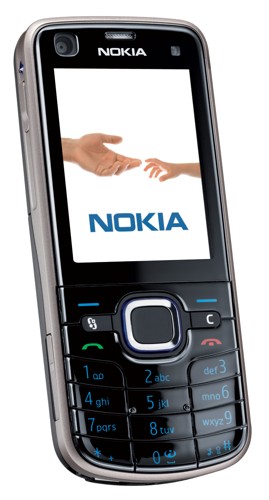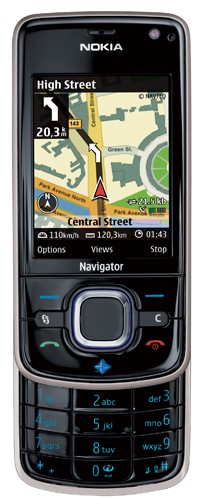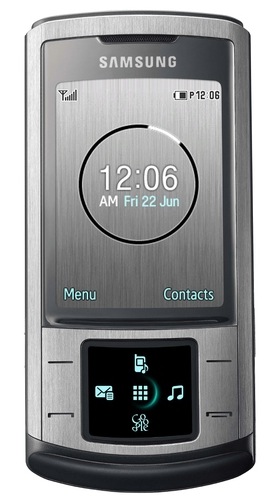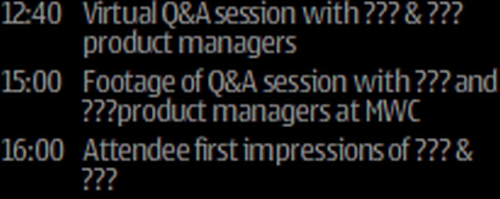Are you awry about N series. They are of course excellent devices and the best in the market. but not everyone requires everything in a device. well then here is the camera mammoth you are looking for. If a non n series 5MPX is all you dreamt for then here is your Gift. Nokia at last heard us and here it unveiled it at the MWC. Welcome the Nokia 6220 Classic Continue reading “First Non Nseries 5mpx From Nokia ~ Nokia 6220 Classic”
Continue reading “First Non Nseries 5mpx From Nokia ~ Nokia 6220 Classic”
Category: News
most important news
MWC 2008 – Nokia 6210 Navigator launched
All of us knew that the MWC 2008 will bring a deluge of handsets. True to the expectation, Nokia launched several new models. The Nokia N96 has been covered extensively on Fonearena, with a deeply insightful perspective. Here’s more:
Nokia 6210 Navigator
The Nokia 6210 Navigator proves Nokia’s interest and commitment to developing navigation handsets.
The handset has a GPS that sends information to Nokia Maps 2.0 and allows you to download information, even of additional points of interest via the HSDPA.

The 6210 Navigator has a S60 operating system and apart from capturing photos and playing music and radio, it also computes a route and provides visual and vocal turn-by-turn directions.
Phew! That’s exactly what some folks driving on our roads need!!!! Continue reading “MWC 2008 – Nokia 6210 Navigator launched”
W980 from Sony Ericsson

Sony Ericsson has added one more weapon to its Walkman aromor by launching the W980. This is a stylish clamshell Walkman phone from Sony Ericsson sporting a 3.2 mega-pixel camera. The phone comes with 8 Gigs of memory and the display of the phone is also as big as the memory of the phone. Continue reading “W980 from Sony Ericsson”
This Valentine’s Day gift your lady a handset
“Handsets are the new flowers” says a leading Mobile company in Canada. At Fonearena, we couldn’t agree more…

There are several handsets that companies have launched exclusively for the ladies.
The Levis handset that targets girls, LG Shine and Sony Ercisson W580i, apart from the range of Moto handsets that are available in PINK colour.
For Indian buyers, L310 and L320 from Samsung are a good pick. So is the Nokia Prism.
So all you gentlefolk out there, gift your lady a handset this Valentine’s Day and make a lasting impression.
Nokia Launches the N96 and the N78
The Mobile World Congress has started and its raining mobiles there. Sony Ericsson launched the XPERIA, their new G Series and one Walkman Clamshell with beefed up memory to compete with the N81 and N82. Sometime back the pictures of N96 leaked on the Internet and then the N96 specs came out on the Nokia site in Germany. Continue reading “Nokia Launches the N96 and the N78”
Continue reading “Nokia Launches the N96 and the N78”
Sony Ericsson G700 and G900 Touchscreen UIQ phones
Well SE aint leaving behind their UIQ division as well.
both phones have identical dimensions. They feature the same 2.4″ 262K with QVGA TFT touchscreen display with QVGA resolution.

Sony Ericsson G700 and G900 will be tri-band handset with 3G capabilities. The handsets sport stereo Bluetooth and will carry 160MB of internal memory. The memory is also further expandable through the built-in Memory Stick Micro card slot.
The Sony Ericsson G900 also features a 5 megapixel camera, while the G700 has a 3.2 megapixel one both with auto focus. An intriguing feature is the ability to manually select the focus point when you shoot just by tapping on the display. Sadly only G900 has Wi-Fi/
Sony Ericsson G700 and G900 will both hit the shelves in Q2 2008. The G700 will come in Silk Bronze color, while the G900 will have a Dark Red and a Dark Brown color version.
Sony Ericsson Xperia X1 first windows mobile handset from SE
Soon for Sure Sony Ericsson will be the King of the Mobile world.
Well makes me so sure. have a look for yourselves…

 Xperia would have every communicator every Q every Atom Every Imate running for hiding. what a Spec. This should be the Mobile of the Millenia. Continue reading “Sony Ericsson Xperia X1 first windows mobile handset from SE”
Xperia would have every communicator every Q every Atom Every Imate running for hiding. what a Spec. This should be the Mobile of the Millenia. Continue reading “Sony Ericsson Xperia X1 first windows mobile handset from SE”
Samung Soul
Samung Soul the latest Samsung is out and it continues their flagship Slider. the new flagship called “Soul” cellphone Get it? Spirit Of ULtra, soul? Yeah. Anyway the specs are quite impressive
we’re looking at a
- quad-band GSM phone
- 7.2Mbps HSDPA;
- 2.2-inch QVGA display;
- 5 megapixel, image stabilized camera with Power LED flash and face detection;
- FM radio;
- microSD;
- Bluetooth
All this sexy specs in a mere 12.9-mm thin slider.

Nokia might launch 2 new Nseries phones this time at 3gsm not 6
Looks like we might see 2 new entrants to Nokia’s NSeries lineup at the 3GSM this week in Barcelona !
Stefan is smart to point out from the itinerary

Can you see 2 sets of questionmarks in the image above ?
Continue reading “Nokia might launch 2 new Nseries phones this time at 3gsm not 6”
Nokia and Facebook talking partnership again ?
It seems talks are in their earliest stages at the moment, but according to mocoNews, Nokia and Facebook reps are mulling a potential partnership, and there has even been whispers of dollars changing hands in the process. Apparently, the deal could involve making the Facebook icon a prominent fixture on Nokia handsets and product displays, and while it’s far from confirmed, it could also involve Nokia “purchasing a stake in [Facebook].” Continue reading “Nokia and Facebook talking partnership again ?”
Nokia Sponsors Grammy Awards
 Well guess Nokia is taking music really too seriously. Well after launching couple of Music Biggies last year like N95 – 8gigs ., N81 twins., etc., where else can nokia focus to show it loves music too even better than its slumping counterpart Sony Ericsson.,
Well guess Nokia is taking music really too seriously. Well after launching couple of Music Biggies last year like N95 – 8gigs ., N81 twins., etc., where else can nokia focus to show it loves music too even better than its slumping counterpart Sony Ericsson.,
Where else but the Big Momma of all Music Biggies – THE GRAMMY’s.
Yesterday Nokia sent out a Press Release announcing that it has become the official sponsor of the Grammy Awards, connecting the company once again with the biggest event in the music industry.
“The GRAMMY Awards are synonymous with the best in entertainment,” said Tero Ojanpera, Executive Vice President and head of the Nokia Entertainment and Communities business. “For the 50th Anniversary of the Awards, we are excited to offer the best of the Awards in exclusive video programming via the Nokia Video Centre, Medeo and other entertainment channels to millions of Nokia device owners around the world.”
GRAMMY Award-winning music is also planned to be available for download from the Nokia Music Store as well as preloaded on selected Nokia devices in key markets. Continue reading “Nokia Sponsors Grammy Awards”
Come rain or snow storm, get the latest update on your mobile in J&K
The winter this year has frozen the boots off North India. It is February mid and yet the snow just ceases to stop dropping out of the sky, much to the discomfort of those living in these regions.

Not only is normal life thrown out of gear, those who have to travel on business or work often get stuck in tedious traffic jams on the Jammu-Srinagar national highway – the major road link between the Kashmir valley and the rest of India. Continue reading “Come rain or snow storm, get the latest update on your mobile in J&K”
N96 out again on the rumor mills – This time too REAL
Well the BIG MOMMA wont be a fairy tale after all. After VIKY posted it a long time back. it all assumed to be a fair rumor. Ofcourse it had to., The N96 was like a BILLION DOLLAR BABY with those specs that would make HILLARY quit the presidential elections..The N96 looks similar to the N95 but is inspired by the new nseries design like the N81.

The Specs of this phone were leaked on the Nokia german site (ofline now ) We can expect this phone to makes it debut at Barcelona next week !!
Specs
- Quadband EDGE
- Dualband HSDPA 850/2100 MHz
- DVB-H Class C
- 92 cc volume
- 125 gram weight
- 103 x 55 x 18 mm
- 16 GB internal memory AND a microSD slot;
- 950 mAh battery
- 6.1 cm (2.8 inch) 320×240 display with 16 million colors
- 3.5 mm headphone jack
- WiFi (802.11b/g)
- AGPS
- 5 megapixel camera with Carl Zeiss lens that also does VGA video recording at 30 FPS, Dual LED flash that can also be used when video recording!
- S60 3rd Edition Feature Pack 2 (Flash Lite 3 enabled web browser included)
- microUSB
We’ll hold off on calling this thing a winner until we see it in person, but other than the lack of HSDPA 1900, there’s nary a spec in the list that we find ourselves frowning over.
Catch the N96 In India FIRST!
And the World will catch em later!!
you could see SHARUKH saying this on our tv screens soon!!
eBay seller offers Nokia Aeon, is a flat out liar
Seems to good to be true? Yesiree, we’re betting it is, too.
A ebay reseller is offering Nokia Aeon. well you might ask whats so wrong in it., citing ebay is afterall for e-selling only.
well looking into finer details..

Nokia’s Aeon is a concept. The concept handset is “Not even released for sale in INDIA yet !, Nokia’s Biggest manufacturing facility and handset market”. Continue reading “eBay seller offers Nokia Aeon, is a flat out liar”
Windows Mobile on Nokia
Nokia has always been happy and successful with using Symbian and maintaining its relations hip with Symbian. No body would ever imagine Windows Mobile running on Nokia phones, but IT Wire has reported that software giant Microsoft is in talks with Nokia and has asked Nokia guys to offer Windows Mobile Operating System on Nokia devices. Continue reading “Windows Mobile on Nokia”
